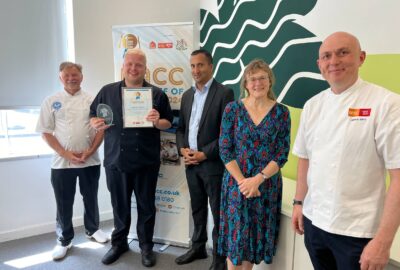Every industry is facing increasing pressure to implement sustainable practices and support the environment, but are we as operators (and individuals) truly owning this task, or merely paying lip service to it? And does it really influence consumer spending habits?
Ten years ago, the power of the conscious consumer was considerably less than it is today. Since then a lot has changed. Demand for ethically and sustainably sourced goods in 2019 reached £41bn1 in the UK, having risen fourfold in the last 20 years. In the fashion industry, the resale market been the fastest growing sector and is now set to be twice the size of fast fashion by 2030. It is clear that consumers are driving substantial changes and the hospitality sector is not exempt.
Research recently conducted by Nestlé Professional has revealed that 82% of UK consumers feel that sustainability is an important factor when considering what to eat and drink. With 71%2 of those surveyed saying they would choose sustainable options should they be available, the opportunity for operators who adapt their business model is huge.
Almost three quarters of UK consumers think hospitality operators could do more to support and promote sustainable living. “Consumers are looking to the industry for change, and although 43% admitted culpability for making sure their diets are sustainable, almost a quarter (24%) said it is also the responsibility of food operators.” Comments Katya Simmons, Managing Director Nestlé Professional UK&I.
The pressure is on operators to make meaningful, lasting changes. Some are forced through by government – the ban on plastic straws being one of the most recent, but others need to be a conscious decision to step away from old practices. But where should you start?
Food waste, sourcing locally, reducing packaging waste/increasing recyclable packing materials, reducing single use plastics and carbon footprint were the top 53 factors said to influence consumer purchasing decisions within the hospitality sector, however the responsibility for change does not fall solely on the shoulders of operators – your supply chain can provide a lot of support too.
Developing a Sustainable Supply Chain
Looking to your supply chain to support sustainable practices can go a long way to get you started. With a little bit of legwork, it is possible to determine how sustainable the brands and suppliers you purchase from truly are, making a list of those who you may need to replace. From global brands to independent artisan producers, knowing what’s behind every product means that you can be more confident in your customer facing statements.
To improve your environmental credentials, focus on 3 key areas in the supply chain: Packaging, Produce and Power.
Packaging
One of the biggest impacts every operator can make is to work with suppliers who are dedicated to reducing the amount of plastic used in packaging or who use 100% recyclable packaging. Almost 80%4 of consumers surveyed stated that minimal or recyclable packaging was an important consideration when purchasing food and drink.
In response to consumer demand, many brands across the sector are implementing sustainable packaging practices. McCain Foods are on track to ensure 100% of their packaging is recyclable by the end of the year and Pladis Global have pledged to make all plastic packaging recyclable, reusable or compostable by 2025. The team have already removed all black plastic from their product portfolio, preventing approximately 80million black trays going to landfill.
The team at Délifrance are also joining the growing number of brands developing fully recyclable packaging. “We’ve been working behind the scenes for some time to set out a robust roadmap that offers a quality solution for customers as we commit to driving eco-change within the business. And what progress we have made already! 98% of packaging is recyclable and 83% of our packaging is based on recycled materials. Delightfully we are on track to meet our 2025 goal as we increase the use of recycled plastics as food safety and hygiene allows.” Comments Stéphanie Brillouet, Marketing Director for Northern Europe and North America at Délifrance.
Produce
With 77%5 of consumers concerned with animal welfare and 76% placing importance on responsible production of food, understanding more about the ingredients and produce you purchase is key.
“The whole ethos of Catch is to measure its food miles in feet and inches” says Mike Naidoo, Executive Chef, Catch at the Old Fish Market. “All the fish we serve is caught in the local Dorset waters and is hours old when it lands on the fish monger’s slab. Catch is about celebrating the whole local food environment. We use a local dairy, a local rare breed farm, a local microgreen grower and we feature wine from 4 local vineyards.”
With both supplier and operator working hard on provenance and sustainable sourcing, the information is no longer hard to find. Brands such as Taylors of Harrogate proudly promote their sustainable sourcing programs and support a wide range of international social and environmental projects from clean-water and education initiatives to long-term tree planting partnerships.
The team at Weetabix are also actively communicating their responsible sourcing policies, using wheat farmers within a 50-mile radius of the factory who commit to sustainable and ethical practices all the way through the food chain. “We require growers to abide by our Wheat Protocol, which sets out environmental as well as quality requirements. All farms must be members of an appropriate environmental scheme and be able to demonstrate compliance, as well as Red Tractor certification. We’ve also been working hard to ensure that all of the cocoa we use, across every single product, is certified as sustainable.” Says John Petre, Supply Chain, Procurement & Technical Director, Weetabix.
Power
Whether suppliers produce or process food, they consume a lot of energy. Check with suppliers to find out if any green energy suppliers providing certificate-backed natural renewable energy are used and how they are off-setting their energy consumption. This will give you a better understanding of the carbon footprint of your supply base.
Achieving a sustainable operation in the hospitality sector is not something that can be done alone – nor should it be. Forming closer ties with suppliers, compiling a knowledge bank on sustainable practices by product or brand results in a plethora of information that can be imparted to a growing environmentally conscious consumer group. Combining this data with your own efforts to create a unique sustainability story will not only give your business a point of difference, it will also satisfy your consumer’s need to make more meaningful purchasing decisions.


